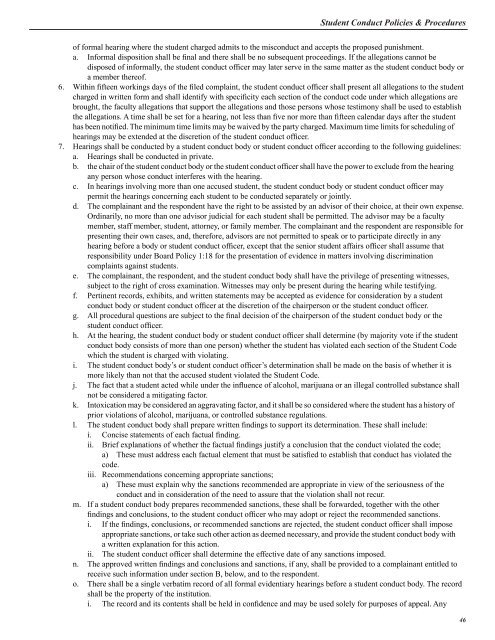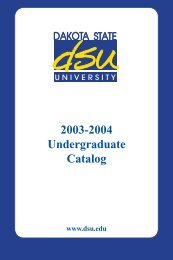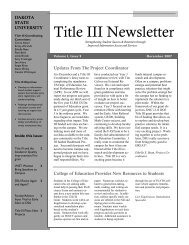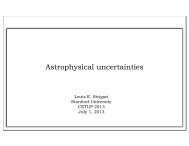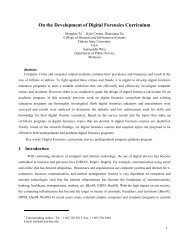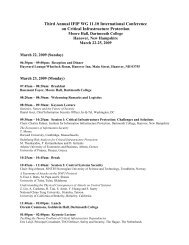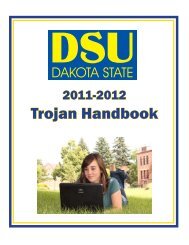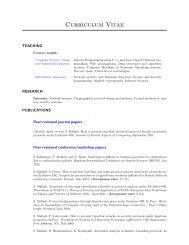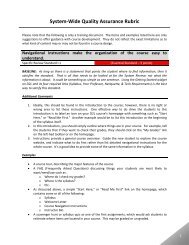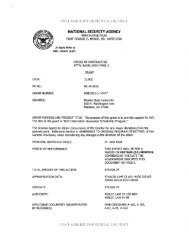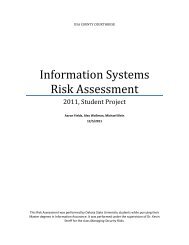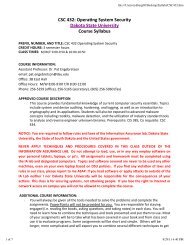Academic Calendar – Fall 2012 - Dakota State University
Academic Calendar – Fall 2012 - Dakota State University
Academic Calendar – Fall 2012 - Dakota State University
You also want an ePaper? Increase the reach of your titles
YUMPU automatically turns print PDFs into web optimized ePapers that Google loves.
Student Conduct Policies & Procedures<br />
of formal hearing where the student charged admits to the misconduct and accepts the proposed punishment.<br />
a. Informal disposition shall be final and there shall be no subsequent proceedings. If the allegations cannot be<br />
disposed of informally, the student conduct officer may later serve in the same matter as the student conduct body or<br />
a member thereof.<br />
6. Within fifteen workings days of the filed complaint, the student conduct officer shall present all allegations to the student<br />
charged in written form and shall identify with specificity each section of the conduct code under which allegations are<br />
brought, the faculty allegations that support the allegations and those persons whose testimony shall be used to establish<br />
the allegations. A time shall be set for a hearing, not less than five nor more than fifteen calendar days after the student<br />
has been notified. The minimum time limits may be waived by the party charged. Maximum time limits for scheduling of<br />
hearings may be extended at the discretion of the student conduct officer.<br />
7. Hearings shall be conducted by a student conduct body or student conduct officer according to the following guidelines:<br />
a. Hearings shall be conducted in private.<br />
b. the chair of the student conduct body or the student conduct officer shall have the power to exclude from the hearing<br />
any person whose conduct interferes with the hearing.<br />
c. In hearings involving more than one accused student, the student conduct body or student conduct officer may<br />
permit the hearings concerning each student to be conducted separately or jointly.<br />
d. The complainant and the respondent have the right to be assisted by an advisor of their choice, at their own expense.<br />
Ordinarily, no more than one advisor judicial for each student shall be permitted. The advisor may be a faculty<br />
member, staff member, student, attorney, or family member. The complainant and the respondent are responsible for<br />
presenting their own cases, and, therefore, advisors are not permitted to speak or to participate directly in any<br />
hearing before a body or student conduct officer, except that the senior student affairs officer shall assume that<br />
responsibility under Board Policy 1:18 for the presentation of evidence in matters involving discrimination<br />
complaints against students.<br />
e. The complainant, the respondent, and the student conduct body shall have the privilege of presenting witnesses,<br />
subject to the right of cross examination. Witnesses may only be present during the hearing while testifying.<br />
f. Pertinent records, exhibits, and written statements may be accepted as evidence for consideration by a student<br />
conduct body or student conduct officer at the discretion of the chairperson or the student conduct officer.<br />
g. All procedural questions are subject to the final decision of the chairperson of the student conduct body or the<br />
student conduct officer.<br />
h. At the hearing, the student conduct body or student conduct officer shall determine (by majority vote if the student<br />
conduct body consists of more than one person) whether the student has violated each section of the Student Code<br />
which the student is charged with violating.<br />
i. The student conduct body’s or student conduct officer’s determination shall be made on the basis of whether it is<br />
more likely than not that the accused student violated the Student Code.<br />
j. The fact that a student acted while under the influence of alcohol, marijuana or an illegal controlled substance shall<br />
not be considered a mitigating factor.<br />
k. Intoxication may be considered an aggravating factor, and it shall be so considered where the student has a history of<br />
prior violations of alcohol, marijuana, or controlled substance regulations.<br />
l. The student conduct body shall prepare written findings to support its determination. These shall include:<br />
i. Concise statements of each factual finding.<br />
ii. Brief explanations of whether the factual findings justify a conclusion that the conduct violated the code;<br />
a) These must address each factual element that must be satisfied to establish that conduct has violated the<br />
code.<br />
iii. Recommendations concerning appropriate sanctions;<br />
a) These must explain why the sanctions recommended are appropriate in view of the seriousness of the<br />
conduct and in consideration of the need to assure that the violation shall not recur.<br />
m. If a student conduct body prepares recommended sanctions, these shall be forwarded, together with the other<br />
findings and conclusions, to the student conduct officer who may adopt or reject the recommended sanctions.<br />
i. If the findings, conclusions, or recommended sanctions are rejected, the student conduct officer shall impose<br />
appropriate sanctions, or take such other action as deemed necessary, and provide the student conduct body with<br />
a written explanation for this action.<br />
ii. The student conduct officer shall determine the effective date of any sanctions imposed.<br />
n. The approved written findings and conclusions and sanctions, if any, shall be provided to a complainant entitled to<br />
receive such information under section B, below, and to the respondent.<br />
o. There shall be a single verbatim record of all formal evidentiary hearings before a student conduct body. The record<br />
shall be the property of the institution.<br />
i. The record and its contents shall be held in confidence and may be used solely for purposes of appeal. Any<br />
46


